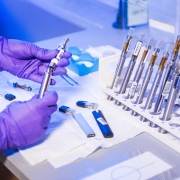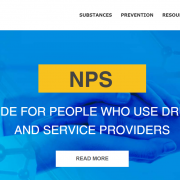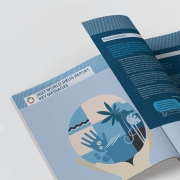People Who Use NPS/Stimulants: Basic Needs and Barriers in Access to HIV Related Medical and Social Services in Ukraine
Today, while much has been achieved in the fight against the HIV epidemic, it remains a major global public health problem. The growing number of HIV infections that disproportionately affect representatives of Key Populations (KP) and their sexual partners is aggravated by inadequate availability of integrated HIV prevention services.
Recognizing the significance of this problem, UNODC has been implementing consistent efforts towards creating a supportive environment for KPs that would contribute to the reduction of the number of new HIV infections among the targeted group. These efforts included developing an integrated approach to the provision of easily accessible HIV-related services, that would also cover people who use new psychoactive substances(NPS) and/or stimulants. For this aim, in 2020 UNODC conducted a pilot study in Ukraine in the two “Fast-Track Cities” (as defined in the framework of UNAIDS Strategy “Fast-Track: ending the AIDS epidemic by 2030”) – Kyiv and Odessa, to assess the needs and identify the barriers for KPs that hampers their access to the HIV-related services. This study revealed a substantial gap in data on the accessibility of HIV testing and treatment services for the KP representatives who use NPS and/or stimulant drugs that justified the need to carry out more in-depth research.
Designated to fill in this knowledge gap, the presented paper is a strategic-level analytical report prepared by UNODC, which the main goal is to develop a better understanding of the basic needs of people who use NPS and/or stimulant drugs and the specific challenges that hinder their access to medical and social services on HIV prevention.
This paper is envisioned to fit within the scope of UNODC’s global HIV programme designated to assist countries in implementing evidence-informed and human rights-based interventions to prevent HIV transmission and to provide treatment, care and support to people living with HIV and AIDS. From a practical perspective, the results of the assessment are expected to support the formation of an evidence-based dialogue with key partners at the national and regional levels and help to determine the focus of advocacy efforts. This will support the Ukrainian government in achieving the goals of the UNAIDS Strategy “90-90-90” and developing a better prevention strategy for the abuse of stimulant drugs and NPS among representatives of KP.
The main target audience of this report is government officials and civil society engaged in the development of national laws and policies related to the HIV/AIDS response. However, for the sake of increasing visibility of the problem, the paper will target a wider audience including international organizations, the private sector and the wider public.
The presented study employed a cross-disciplinary approach incorporating a desk review of the existing relevant literature as well as focus group discussions (FDG) and an anonymous online survey. The conducted assessment is based on a number of relevant guidelines and manuals, such as technical guide on “HIV prevention, treatment, care and support for people who use stimulant drugs” to develop an improved understanding of HIV-related health issues and medical and social services. In addition to that, whenever possible the authors of this paper engaged public and private partners, leveraging a broad set of expertise to make the report more informed and balanced contributing to greater feasibility of its objectives and goals.
From a methodological perspective, the presented report employed qualitative content analysis of primary data gathered from the focus group discussions (FDG) and an anonymous online survey. To ensure a gender perspective in the conducted research, the report ensured to incorporate the accumulated experiences of both male and female representatives of KPs in the focus group discussions. In total, the study engaged 258 representatives of the KPs who use NPS/stimulant drugs. The results revealed that the majority of respondents are aware of the possibilities provided by health facilities, but help/services provided by NGOs are much less understood or visible. In addition, it was pointed out that the existing educational, informational and preventive activities need to be more efficient, audience-oriented and brought closer to the immediate environment of KPs. Unethical behaviour of staff in public health facilities and high tariffs for services also hinder the access of KPs to a range of HIV services, as do problems with law enforcement (LE) and criminalization of PS – which represent one of the core problems for the majority of participants in the assessment.
You can download the technical report AT THIS LINK.






